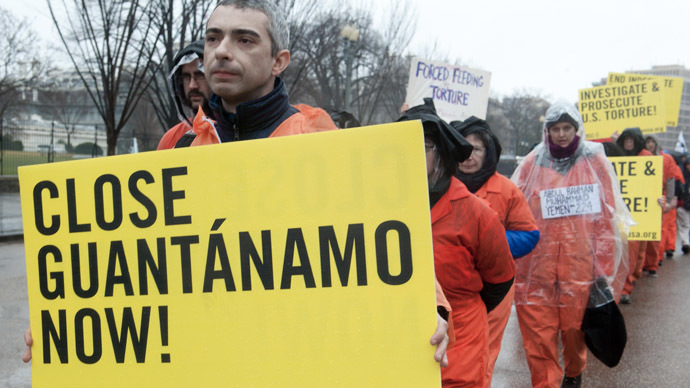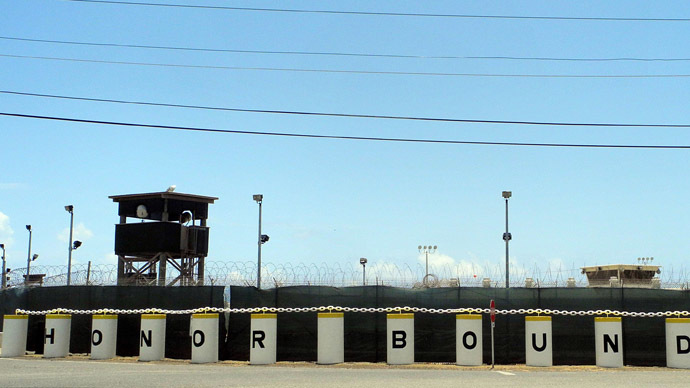Gitmo saga: 'The US is about freedom, not about holding people without charge'

We might have many transfers from Gitmo in 2014 - every day that a man sits without charge in Guantanamo is another black stain on US history, Carlos Warner, Federal Public Defender, told RT.
RT:Today marks five years since President Obama signed an order to close Guantanamo. Why is it still open?
Carlos Warner: Well, it’s time for the president to act. When we talked earlier the president claimed he had no power to transfer people. Now it’s without question that he has full authority and power to transfer people. Now it’s time for him to actually do it. We’ve seen a trickle of transfers but I agree that people should be going out by the dozens at this point.
RT:From a legal point of view, what do you make of holding people without charge and indefinitely?
CW: Hopefully, these numbers are going to dwindle, but the Administration still wants to hold some people indefinitely. And what we do in the United States is that we charge people or we release them. We do not hold people indefinitely. It’s completely against our laws, to hold people indefinitely, it’s certainly against international law as well. But let’s hope that the Administration means what it says, that they are putting everyone through this periodic review process and let’s hope that they are going to be transferred.
RT:Some of these prisoners could well be terrorists, so is it responsible to simply let them go?
CW: That's been debunked so many times over the year. Obviously, we know that people being held in Guantanamo are not the worse of the worst. They have mostly political problems. Many of them are from Yemen. The situation is still unstable in Yemen, but certainly the idea that these are hard terrorists, that’s not the case. In fact, Colin Powell and his staff said many years ago that they knew that the majority of the men being brought to Guantanamo were innocent. In fact, it’s not hard to believe that people that are there now are innocent.
RT:Isn’t the world a safer place with detention camps like Guantanamo?
CW: It’s funny because I was watching a lot of World War II history and that was exactly the same argument that was made there: that we are safer by putting innocent people behind bars. That’s just not how our country functions. Our country is about freedom, not about holding people without charge for something that some people, maybe the majority of the US citizens, will be up to no good one day. That’s not what we do. We hold people who have committed crimes, not innocent people.

RT:Given the criticism over the billions spent on Guantanamo, the human rights scandals, the hunger strikers and their force feeding - nothing is going to close the facility?
CW: In this profession you have to be an optimist sometimes. And we have seen the Administration transfer over the past few months about 11 individuals who were at Guantanamo, certainly since the hunger strikes began. They were the easy solutions, now they are getting down to more difficult ones. Again, guilty or innocent – it’s not an issue, it’s about where these individuals are going to go. Will they go to Saudi Arabia? Will they go to Kuwait? Will they go to Qatar? Will they go back to Yemen? We don’t know those questions, but they need to be answered, because every day that a man sits without charge in Guantanamo is another black stain on our country’s history.
RT:Do you personally see any light at the end of the tunnel - what are the chances we will soon see Guantanamo closed and the detainees released?
CW: I can’t predict the future, but if I was a betting man, l'd say that we will have many transfers in 2014, but we will still have a core of 30 to 40 men at the end of the day that our country will have to decide what we are going to do with: are we going to charge them or are we going to release them. But I think that we could see in 2014, and I’m being very optimistic, maybe up to 100-120 transfers. And that’s the people who have been cleared time and time again by not only Obama Administration, but also the Bush Administration. And President Obama's own periodic review said they’ve recently cleared the individuals that before they said they would never release. So my optimism tells me that we will have large-scale transfers this year. But I hope it’s not at the end of the year, these men should be released immediately.
The spirits of many men were lifted by these transfers we have seen, and certainly we have others who believe that this is just the same story over and over again. I think each of them is entitled to that opinion because we don’t really know what’s going to happen this year, but I’m trying to assure them that we are doing everything we can to work with the Administration to have them transferred. And I hope that when we talk in 6 months, I’ll tell you that 6 out of my 12 clients, or 8 out of my 12 clients have been transferred from Guantanamo. I think it’s a real possibility but it’s going to take the president to continue [putting] pressure, it has to continue to be a priority for the Administration.
The statements, views and opinions expressed in this column are solely those of the author and do not necessarily represent those of RT.
The statements, views and opinions expressed in this column are solely those of the author and do not necessarily represent those of RT.












